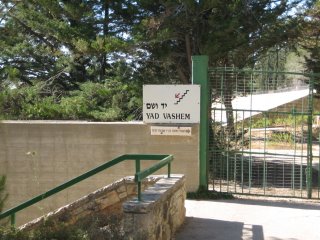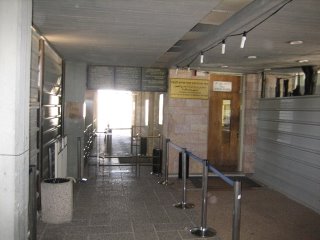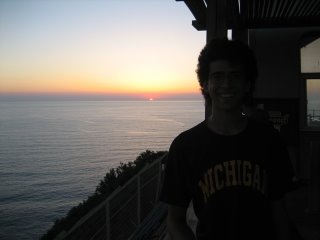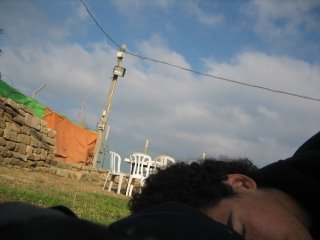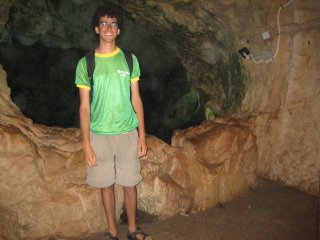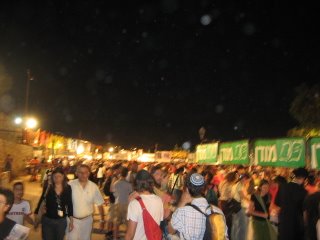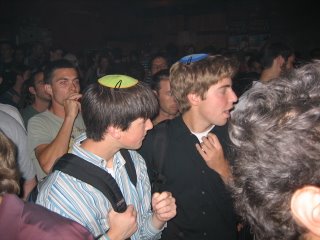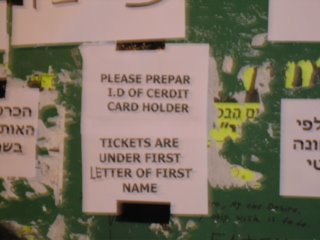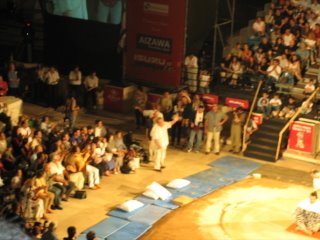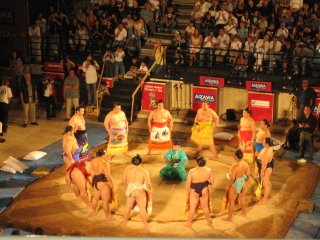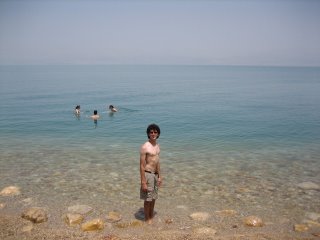It took three trips to Israel, but I finally visited
Tsfat (the hub of mystical Judaism) this weekend (There are numerous acceptable and unacceptable English spellings of the city's name). I had no idea what I was missing.
Actually, I was supposed to be in Safed for the first Shabbat of my senior class trip but weather in New York delayed our flight one day and forced us to switch our plans.
Beware, flying stromels!I met Ari (of watermelon-eating fame) at the Central Bus Station at 9:20 to take the 9:30 bus to Safed. But the website did not say that the bus loaded on the street across from the bus station instead of the terminals inside (or at least I don't think the site said anything). To make a short story even more consise, we missed the 9:30 bus and found space on the 10:00 one.
I chose my words carefully because by the time we boarded the bus, every seat was filled. So, we sat in the aisle. Ari and I shmoozed for an hour before he drifted back to sleep for some time. He was unexpectedly awaken from his slumber by stroimels that fell from the overhead storage space when the bus made a sharp turn.

Almost three hours into the 3+ hour busride, I heard a language spoken by the guys sitting above us that sounded familiar to me, and it wasn't English, Hebrew, or Spanish. It was Yiddish. For those who don't know, I took one semester of Yiddish at Michigan and fell in love with the language (Shmooze is looking to do more Yiddish-, Ladino-, and Farsi-related programming in the fall). Naturally, I told the guys that I spoke a
bisl Yiddish, and we had a little conversation.
You need to get rid of that "s"I made reservations for the
Beit Binyamin Youth Hostel in Safod on Thursday night. Well, at least I thought that I did.
After 40 minutes of getting lost in and around town, we stumbled upon the hostel. We spent seven minutes looking for the entrance to the building before we realized that the car entrance and the pedestrian entrance were the same (which contradicts the sign to the left of the car entrance). We entered the office and told the man that we have a reservation to spend the night. Let me give you a transcript of the conversation (more or less):
Ian: I would like to check in for the night. Here is our confirmation number. I made the reservation last night on the computer.
Hostel worker: You see, we are religious in Safed, so you can't make online reservations.
We tried to mend the situation (and understand what he was saying), especially because I gave the website my credit card number, but I assumed that because they can't use the internet in Safed, they can't get my credit card information either. Then he told us how much it would cost to stay for Shabbat and eat meals (NIS 240 per person). That is not what I consider to be a hostel price. More of a hotel rate, if you ask me.
I would like to say that the Israel Youth Hostel Association should realize that it is falsely advertising the word hostel. According to my definition, no hostel rate in Israel should be over NIS 100 at the most. And even that should be a very nice hostel. This place was nice, but should be called a hotel instead of a hostel.
A bed, and maybe a toiletAfter we left the hostel, we tried to get back to town. Unfortunately, the signage in Tsafed does not give the pedestrian the correct information about where to turn or not turn. So we took about 40 minutes to walk from the hostel the Old City (the hostel was near the Elite candy factory on outskirts of downtown [Ari hummed the Charlie and the Chocolate Factory theme when we passed by it]).
We saw signs for hotels on the main street and inqured about vacancy (they don't believe in vacancy/no vacancy signs in Sfat). We walked into one called the Tel Aviv Hotel, which seemed to fit our needs (place to sleep) but the woman turned us away because we were boys. She said that there were a lot of girls staying there and would prefer if we stayed somewhere else.
We started to walk out of the alley to continue the quest. At that moment a miracle took place. We passed by a sign that said cheap rooms. I thought that it might have had a halo around it, but Ari disagreed. Halo or no halo, we went inside an inquired about a room. The old woman gave us a rate, and at about 2:30 in the afternoon, we would accept anything under NIS 100. She showed us our accomodations, which included another all-in-one bathroom, which is used for optimum efficiency.

After 90 minutes of wandering around Safed with the sun beating down on us, we were a little sweaty and a little hungry.
We found a nice place off Jerusalem St. that was just about to close for Shabbat before our empty stomachs entered the room. Like most other Israeli establishments, this restaurant seemed to struggle with the English language. But this one seemed worse than others. A few examples to prove my point. Carrot spelled carotte. Moroccan spelled Marrocan. I ordered "kabab," while Ari ordered chopped liver.
With our appetites satisfied, and a few hours remaining before Shabbat, we noticed that the masses were flocking to a stone building on the hillside next to the cemetery. The Mikveh.

For those of you that don't know what a mikveh is. It is a ritual pool that Jews dip themselves in for purification purposes. It is often done at conversions, before holidays, and before the Sabbath. And the Safed mikveh is not ordinary mikveh. It is known as the
Ari mikveh, named about Rabbi Isacc Luria (a famous rabbi). It is said that anybody who enters its waters will not die without making
teshuvah (repentance).

Inside of the mikveh there is the equivalent of a locker room, but with tsitsit, stroimels, kippot, and other forms of clothing strewn around the cubby holes. In the back there is the entrance to the mikveh, which is much smaller than I expected. There is space for three people at the most, and there is a long line of naked men waiting to get in.
As I get to the front of the line, a naked guy cuts me in line. I didn't have my glasses on so I couldn't see who it was, but I suspect is might've been Ari (He might have taken responsibility for the action later). If it wasn't Ari, the move would show how Israelis are pushy in any line, even the mikveh line.
After we mikvehed, we returned to our room to play cards and get ready for Shabbat.
Searching for Shabbos dinner (rhymes with Seaching for Bobby Fisher)We went to the 16th century
Abuhav Synagogue for Kabbalat Shabbat. It was a sephardic service, so we had a little trouble following along (The chair in the back of the room has been host to circumcisions for over 200 years). The chazan (prayer leader) lead services from a pulpit in the midde of the sanctuary. After the service, we asked around to see who would host us for a shabbat dinner. Finally, we found our way to the rabbi who accepted us as guests.
He led us from the shul, through the narrow streets. As we walked, crowds sang and danced in the middle of the streets in celebration of the Sabbath's arrival. Before we went inside, he led us to a railing that looked over the opposing mountains. The last rays of sunshine were glowing off the summit of this hills creating a magnificent sight. The rabbi led us into a builing with a large table set for about 20. He led us to a small table away from the 20-person table and told us to wait and that this would be our own private meal. We didn't know what to think about this, but we went along with it. We asked the rabbi if there was anything we could do to help.
We continued to wonder why we were sitting at a separate table as people began to enter the building. The rabbi asked us to set up places and get salads on the tables. We did kiddush a few minutes later and began dinner. It took about 40 minutes for the big table to fill up. The rabbi worked in the kitchen the whole time helping to serve the meal. The food was good, but as good as it is to eat Shabbat dinner with Ari, the atmosphere was a little lacking. Then Ari noticed a sign on the wall that said "soup kitchen." How am I supposed to feel?
Did the rabbi sit us separately from the others because he knew how many people were coming? Did he think we would be uncomfortable around the other diners? Who were the other diners? All questions that I won't be able to answer for you. The rabbi was very nice, and we were very appreciative of him hosting us for Shabbat dinner.
We went back home, played cards on a street corner, and took a brief stroll through town before turning in for the night. On the way back from shul, we passed this seeminly insignificant alley, just don't tell that to Grandma Yocheved, whose house is at the end of it. The abnormally narrow alleyway is known as the narrowest alley in town. Grandma Yocheved believed that when the messiah comes, it will surely walk through her alley.
How do they wake up so early without alarms?In the morning, we slept in a little bit. There was a miscommunication the night before about what the person who wakes up first is supposed to do with regards to waking up the other person. As a result, we did not leave our room until after 10:00. By that time, every service was finished.
At the Abuhav synagogue they announced that morning services would be at 4:30 with a later service at 7:30. We took this to be the exception, rather than the rule. I guess we were wrong.
And you do this every week?When we accepted the fact that we missed Shabbat morning services, we began our search for a place to eat lunch.
We asked the old woman who we rented the room from if she knew of anywhere that accepted guests for lunch, She said that a man named Ben David always had people over, but she didn't know where he lived. We wandered through the streets asking people for Ben David until we ran into one of his "neighbors" who showed us to the door. When we got there, there were two tables set up in Ben David's living room with about 17 people seated there. Within five minutes, tables were unfoled, chairs set down, benches erected, and 20 more people had places to eat. Almost all of them wore black hats when they entered the room. Then they each found a unique place to put their hand and coat so that they would remember it when they left because everybody's hat and coat looked alike. (Note: Ari was the only person in the room not wearing white, black, or a kaftan)
Again, the pushiness of orthodox Jews showed when Ben David put the food on the table, WIthin seconds, whatever food or beverage was set out was all gone. The hummus from our table was "borrowed" by the next table and emptied within seconds. They didn't even return the container. For dessert, Ben David served watermelon. Not everybody got a piece of watermelon because some people hoarded it. One person took four sections of watermelon.
I have a fashion question. Since when is the short, fat, loose tie with unbuttoned shirt in style? I have seen it on countless orthodox Jews, and I don't understand it. I can see myself wearing my tie loose and shirt unbuttoned on the way home from dinner or shul, but not at shul or at someone's house.
Ben David is big into
Rabbi Nachman of Braelov. There were constant references made to Uman (the site of Rabbi Nachman's grave) and songs sang about him.
At one point, Ben David welcomed his American guests by doing a James Brown impersonation, or at least that is what it sounded like. (Do you all feel good?) I find it incredible that he hosts 40 people to his house for Shabbat lunch every week. It is a great mitzvah to welcome guests into your home. And people like me (people without a place to eat Shabbat lunch) are most appreciative of people like him.
After lunch (1:30), we went across the street to pray mincha (afternoon service). When we finished mincha. we went back to the room to read and sleep for a couple of hours. Then, we went for a walk through the Citadel Park in the middle town.
Then, we went searched for a place to eat Seudah Shlishit (the third meal of Shabbat). While waiting for services to begin, Ari unleashed this gem of a comment.
Ari: Where are you
frum? Everywhere. (frum means Orthodox)
We went to the Kosov shul, where we prayed the mincha service once again (reaching the three service total, though an irregular combination).
We sat down around a table filled with small rolls for motzi. Then somebody threw bags of sunflower seeds. almonds, and popcorn. Then somebody put out plates of kugels (wouldn't cut is at the kugel-off). A few minutes later, they put a vat of cholent in front of me an Ari. However, there were no plates for the first few minutes. When the choluent came out, there weren't spoons.
When there is one pot of cholent for about fifty people, how picky can you be about getting only the vegetables or meat pieces that you prefer? I'm looking right at you, first-guy-to-take-from-the-pot-and-took-three-of-the-seven-pieces-of-meat guy.
This cholent was pretty good, too. I think that it would have finished in the top five of any Iron Blech competition and if the chef knew that it was going to be in a contest, top three for sure.
Did I do that?After
havdalah (service that brings Shabbat to a close), we hustled to the bus station to beat the post-Shabbat rush back to Jerusalem. We did.
Obviously, we had to choose the seats where the air conditioner could not be adjusted because the part was missing. So after an hour of cold air blasting our faces, Ian solved the problem by jamming his t-shirt in the vent to prevent the cold air from blowing into his face.
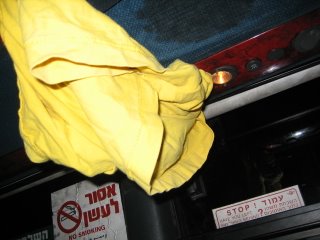
An hour later, Ian was awaken from his slumber by a panic on the bus. I turned around to see what was happeneing. There was smoke coming out of the back of the bus and people were unloading from the front of the bus, and taking all of their things with them. It was a little weird that the bus driver did not open the back door, but I guess that if it were really an emergency he would've. It turns out the bus was overheating.
We walked away from the bus as two more stopped on the side of the highway to pick us up. We were about 20 minutes outside of Jerusalem on Highway 1, so there were a lot of buses driving by.
I can't help but think that my t-shirt jamming the vent might've contributed to the bus overheating. Hopefully not.




